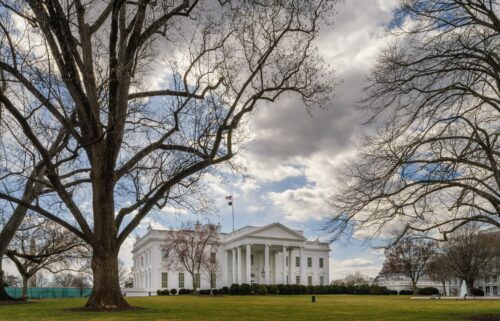Trump’s NIH pick grilled on research funding cuts and vaccine views in Senate hearing
By Jacqueline Howard, CNN
(CNN) — President Donald Trump’s pick to lead the National Institutes of Health answered sharp questions in a confirmation hearing Wednesday about his views on vaccines, research funding and the role scientists should play in a pandemic.
Dr. Jay Bhattacharya, a health economist and professor at Stanford University, well-known for his criticism of Covid-19 lockdowns and mitigation policies, repeatedly told senators that, if confirmed, he is committed to following the law and ensuring that NIH scientists have the resources they need to do their work.
Bhattacharya also said that, even though extensive research has shown there is no link between vaccines and autism, he is open to supporting more studies on the topic.
Bhattacharya would report to Robert F. Kennedy Jr., secretary of the US Department of Health and Human Services, who has previously promoted false claims about vaccines.
‘I don’t think that there’s a link’
At Wednesday’s hearing, Republican Sen. Bill Cassidy of Louisiana, a former physician who has spent his career touting the safety of vaccines, mentioned that an unvaccinated child has died in an ongoing measles outbreak in West Texas and asked Bhattacharya to comment.
“I’ve been told that you have said that we need to invest NIH resources into looking at a possible link between measles vaccine and autism. I’ve not heard that directly; it’s hearsay. Any comment on that?” Cassidy asked.
“Senator, it’s a tragedy that a child would die from a vaccine-preventable disease. I fully support children being vaccinated for diseases like measles that can be prevented with the vaccination efforts,” Bhattacharya responded.
“As far as research on autism and vaccines, I don’t generally believe that there is a link, based on my reading of the literature,” he said. “But what I have seen is that there’s tremendous distrust in medicine and science coming out of the pandemic. And we do have, as you know, senator, a sharp rise in autism rates in this country. And I don’t know, and I don’t think any scientist really knows, the cause of it. So I would support an agenda — a broad scientific agenda, based on data — to get an answer to that.”
Cassidy pushed back, saying that the topic of the measles vaccine and autism has been “exhaustively studied” and that there are limited resources for a new agenda.
“I don’t think that there’s a link between the MMR vaccine and autism,” Bhattacharya said. “But if those concerns result in parents not wanting to vaccinate their children, for a vaccine that is well-ested, my sense is, my inclination is, to give people good data. That’s how you address those concerns.”
Cassidy called it “wasting money” to study a connection between vaccination and autism when multiple studies that have been validated show no evidence of a link.
“What we need is the well-done research finding the true reason for autism,” Cassidy said.
Bhattacharya responded, “That’s where the vast majority of effort ought to go.”
Bhattacharya added later in the hearing that he thought the NIH should not have pushed for vaccine mandates during the Covid-19 pandemic.
“The proper role of scientists in a pandemic is to answer basic questions that policy-makers have about what the right policy should be. Our role isn’t to make decisions,” Bhattacharya said.
“The science should be an engine for freedom – knowledge and freedom,” he said. “It shouldn’t be pushing mandates for vaccines that have been, like the Covid vaccines, were tested for a relatively short period of time. I took the Covid vaccine myself, but I think that the mandates that many scientists push have led to the lack of confidence that so many of the public has in science. If science is a force for freedom and for knowledge, it will have universal support. That’s what the role of science is.”
No ‘intention to cut anyone’ at NIH
In the wake of the Trump administration and Elon Musk — under the Department of Government Efficiency — firing many federal workers, Bhattacharya told senators that he does not intend to “cut anyone at the NIH” if confirmed as director.
“We’ve had grant freezes, pauses on advisory meetings, pauses on clinical trials, mass firings being carried out by the so-called DOGE. It is really threatening our ability to treat childhood cancer, to mitigate the effects of Alzheimer’s disease and other forms of dementia, and to better understand and treat women’s health issues,” Democratic Sen. Patty Murray of Washington said.
“Do you support the recent researcher firings and grant freezes that have been implemented by Trump and DOGE?” she asked Bhattacharya.
“If I’m confirmed as NIH director, I fully commit to making sure that all the scientists at the NIH and the scientists that the NIH supports have the resources they need to meet the mission of the NIH, which is to do research to make America healthy,” Bhattacharya responded. “I don’t have any intention to cut anyone at the NIH.”
When Murray asked what he would do regarding research funding cuts and pauses on clinical trials specifically, Bhattacharya said he would assess them on his first day as director.
“I’m going to understand what resources the whole NIH needs and make sure that the scientists that are working at the NIH have the resources to do the lifesaving work that they do and that the scientists that are supported by the NH also have that,” he said. “The personnel decisions are hard to talk about, unless I’m actually confirmed and I have more data.”
Bhattacharya later added that he would follow the law regarding the Trump administration’s efforts to cut public health funding.
The administration shocked and worried researchers last month when it announced plans to significantly lower the maximum amount of indirect costs that research institutions could charge the government under NIH funding, capping the indirect cost rate that a NIH grant would cover at 15%. It’s estimated that the average NIH grant to an institution has typically had about 30% earmarked for indirect infrastructure costs such as facilities, maintenance and security; some institutions have charged up to 60% or more.
A federal judge later blocked the administration’s effort to cut back on federal funding for the NIH for research programs at universities and medical systems.
When asked whether he would reverse course on having a one-size-fits-all 15% cap on indirect cost coverage, Bhattacharya said, “if confirmed, I absolutely commit to following the law, to addressing this issue very directly. I think that this is one of these issues, to me, it’s an indicator of distrust that some have of universities and of the scientific process. And so I want to make sure that we address those concerns, as well.”
Bhattacharya added that he doesn’t know exactly where the money for indirect costs always goes.
“I think that a lot of it likely goes to things that are worthwhile. And I’ve heard lots of folks, including from Stanford, who say that – and I agree with them — support for buildings, light bulbs to make sure that we can see in the lab and a whole host of other important things,” Bhattacharya said.
“But there’s a lot of distrust about where the money goes,” he said. “I think transparency regarding indirect costs is absolutely worthwhile, and it’s something that universities can fix by working together to make sure that where that money goes is made clear. I want to make sure that the money goes to the research.”
Following Trump and Kennedy’s agenda
Overall, Bhattacharya said, he has “five concrete goals” if confirmed as NIH director.
“If confirmed, I will carry out President Trump and Secretary Kennedy’s agenda of committing the NIH to address the dire chronic health needs of the country with gold-standard science and innovation,” he said.
His first goal is for the NIH to focus on research that “solves the American chronic disease crisis,” which he described as severe and includes conditions such as obesity, heart disease and cancer.
“Second, NIH-supported science should be replicable, reproducible and generalizable. Unfortunately, much modern biomedical science fails this basic test,” Bhattacharya said.
“Third, if confirmed, I will establish a culture of respect for free speech in science and scientific dissent at the NIH. Over the last few years, top NIH officials oversaw a culture of cover up, obfuscation and a lack of tolerance for ideas that differed from theirs,” he said.
During the Covid-19 pandemic, Bhattacharya held views that differed from those of many other public health experts. He was a critic of lockdown policies, and in 2020, he co-authored an open letter called the “Great Barrington Declaration,” which called for a focus on protecting the most vulnerable, such as older adults, while ending lockdown measures such as school closures.
“Fourth, the NIH must recommit to its mission to fund the most innovative biomedical research agenda possible to improve American health. My plan is to ensure that the NIH invests in cutting-edge research in every field to make big advances, rather than just small, incremental progress over years,” Bhattacharya said Wednesday.
His fifth goal is for the NIH to “vigorously regulate risk research” that has the possibility of causing a pandemic, he said, and for the agency to “embrace transparency.”
“While the vast majority of biomedical research poses no risk of harm to research subjects or the public, the NIH must ensure that it never supports work that might cause harm. If confirmed, I will work with Congress and the administration to guarantee that happens,” Bhattacharya said.
“While I believe there are real problems to be addressed, I want to finish by reiterating my great respect for the work and mission of the NIH. If confirmed, I’ll carry out President Trump’s agenda of making the public science institutions of this country worthy of trust and serve to make America healthy again.”
The-CNN-Wire
™ & © 2025 Cable News Network, Inc., a Warner Bros. Discovery Company. All rights reserved.


